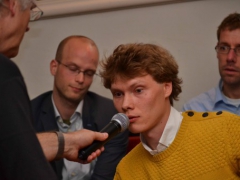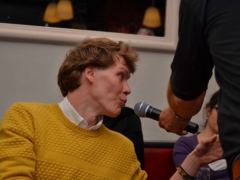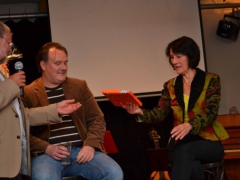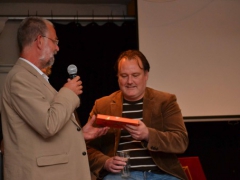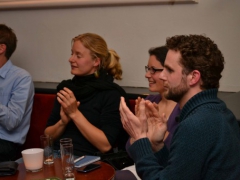Summary
Natural resources are under pressure, yet the world population grows. How are we to supply future generations with the resources to support a happy and healthy life? These questions have inspired many to conceive alternative economies, where the production-consumption-waste chain is broken. One of these novel ideas which is formulated as the “circular economy” radically changes the concept of “resource” and “waste”. In this edition of Science Cafe Wageningen, Louise Vet will place this concept as well as the concepts of blue economy, biomimicry and green chemistry in a theoretical framework and discuss how such alternative economies could function.
Societal changes, such as the move to another production-consumption-waste chain, require individuals and corporations to make deliberate choices. Social psychologist Michel Handgraaf will discuss the change towards a circular economy from a decision-making perspective.
Prof.dr.Louise E.M. Vet is a Professor of Evolutionary Ecology at Wageningen University and director of the Netherlands Institute of Ecology (NIOO), the largest institute of the Royal Netherlands Academy of Arts and Sciences (KNAW). She is a biologist with a broad interest in ecology and evolution of multitrophic interactions. She is an elected member of the Royal Netherlands Academy of Arts and Sciences. Vet was awarded several international prizes for her research. In addition to her professional interest in high quality ecological scientific research, she has a special interest in communicating the importance of ecology to the general public. Her recent outreach focuses on achieving a positive interaction between ecology and economy. Practice what you preach: she was the driving force behind the realization of the highly innovative and sustainable laboratory/office complex of the NIOO in Wageningen.
Dr. Michel J.J.Handgraaf is Associate Professor at Wageningen University (Economics of Consumers and Households). He is a Social Psychologist / Behavioural Economist with strong interest in Judgment,Decision Making and Interdependence. His main areas of research are bargaining, interdependence and the psychological aspects of economical and environmental decision-making by individuals and groups. He is also principal investigator at the Center for Research on Environmental Decisions of Columbia University NY.
Folkband VreemdeStreekjes plaeds music that combines various styles and cultures. They play mostly instrumental (flute, violin, low whistle, guitar, bass, accordion and melodica) with influences from celtic and romanic cultures and a touch of tango.
Gallery


